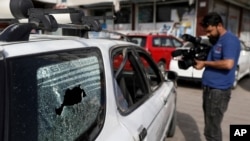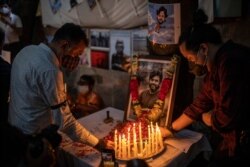Afghan journalists say they are living in fear and are frustrated by the slow and complicated process of finding safety in a new country.
“I am very disappointed,” a journalist who worked with an international media outlet told VOA. “I do not know what will happen to me. I really fear for my life.”
The journalist, who asked not to be identified for security reasons, says she and her family left Herat a day before it fell to the Taliban. Before that, fighters had been threatening her via phone and in person.
The journalist moved to Kabul. But that too has fallen.
Even in Kabul the journalist says she has received threats and that Taliban fighters visited the area where she and her family are staying. “I was scared to death when I was told that the Taliban are in the neighborhood.”
“We stay in a room as prisoners. We cannot go out,” said the journalist, who has reported for an international broadcast outlet and news agency. “I just want (us to be) evacuated to a place where we feel safe.”
Shifting power
The Taliban entered Kabul on Sunday after President Ashraf Ghani fled the country and the government collapsed.
At a news conference in Kabul on Tuesday, the Taliban said journalists are free to work as long as they are fair, promote national unity and do not report against Islamic law.
But media rights groups and journalists are cautious, highlighting the threats, attacks and killings carried out by the Taliban in recent years.
At the press conference Tuesday, one reporter pointed out to the Taliban spokesperson that he occupied the seat of Dawa Khan Meenapal, the head of the government’s media information center, whom the Taliban killed in Kabul on August 6. Before working for the government, Meenapal was an award-winning reporter for Radio Free Europe/Radio Liberty’s Afghan service.
The German public broadcaster Deutsche Welle reported Thursday that Taliban fighters shot dead a relative of one of their journalists in western Afghanistan. Other relatives of the journalist, who currently works in Germany, have gone into hiding, the broadcaster reported.
The Taliban have searched the homes of at least four journalists, and there are reports that fighters beat two journalists who were covering a protest against the group in the eastern city of Jalalabad, according to the New York-based Committee to Protect Journalists (CPJ).
A journalist who has worked for Deutsche Welle and other international and local outlets in Afghanistan's eastern provinces doubts the Taliban are committed to the freedom of expression.
“It will not be possible to work as a journalist anymore. The situation is worsening day by day, and I am losing hope,” he told VOA.
In the two decades since the fall of the Taliban, Afghanistan built an extensive media scene, with female journalists taking a central role. The country ranked 122nd out of 180 countries where 1 is freest, in the most recent index released by Reporters Without Borders (RSF).
But a rise in threats and targeted killings since the Intra-Afghan peace process began in September 2020 had already raised concerns about the future of journalism. Hundreds of reporters either quit the profession or left the country in recent months.
The Deutsche Welle journalist told VOA that he moved with his wife and family to Kabul for safety reasons.
“We were balanced and fair in our reporting, but there are some groups in the Taliban who do not know professional journalism. Those groups might create problems for me,” the journalist said.
He added that he wanted to leave because of the security threats. “Let’s see if someone can help us to move to a place where we would be safe.”
Western media outlets have been pressing the U.S. and other governments to help relocate hundreds of journalists who worked with their staff in recent years.
Deutsche Welle is among the Western media outlets petitioning their governments for help. The broadcaster said Tuesday it is working with Germany’s foreign ministry to try to evacuate employees and their families who are “under acute threat."
“The fact that they worked for a Western broadcaster could result in torture and death," the broadcaster said in a statement.
The outlet said that Taliban fighters had searched homes, looking for its employees.
The co-chairs of the bipartisan U.S. Congressional Freedom of the Press Caucus have also called on President Joe Biden to evacuate media at “extreme risk because of their reporting.”
Those who worked with American news outlets are eligible to apply for a Priority 2, or P-2 program, announced by the State Department this month. The program gives them and their families the chance of relocation in the U.S.
A Kabul-based Afghan journalist, who did not want to be named for fear of retaliation, told VOA that the requirements of the program are tough.
“One has to go to a third country and stay there for 12 to 14 months on his own expenses. Journalists in Afghanistan are living paycheck to paycheck, and they cannot afford living in a third country for months,” the journalist said.
Believing he is in danger, the journalist said he is looking at all options to get out of Afghanistan. “I have not written something against them (Taliban), but I have been defending the republic, democracy, and that is enough for being targeted.”
“We are at risk here,” the journalist adding, saying that the U.S. and other nations should speed up the evacuation process.
CPJ’s Asia program coordinator Steven Butler acknowledged that the P-2 program is not “a practical option’’ for many, but said that the U.S. can use a “humanitarian parole” option.
That option allows an individual to enter the U.S. temporarily for emergency or humanitarian reasons.
“We hope that a number of journalists can take advantage of that,” Butler told VOA, adding that so far “very few” journalists have been evacuated.
CPJ is receiving hundreds of pleas for help from journalists in Afghanistan. “We are working on identifying those who are most at risk and provide that information to the U.S. government so that they expediate their evacuation,” Butler said.
News outlets and nongovernmental organizations are also trying to support Afghan journalists. The Open Society Foundation announced a $10 million emergency fund this week to help move to safety members of the media and those who worked for civil society.
This report originated in VOA’s Afghan service.







